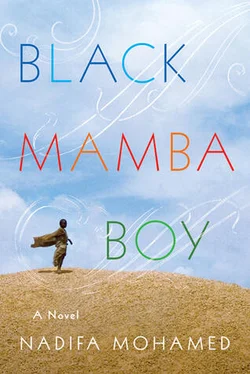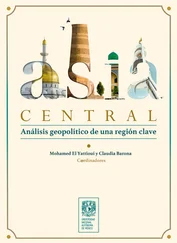Awate lived near the shop with a distant aunt of his father’s but he visited Jama every day to grab sweets and share his achievements. His face had filled out and he looked nothing like the wraith Jama had found.
Hakim, the shopkeeper, at first kept a close eye on Jama—“I’ve had boys work for me and rob me blind, my rule is any thieves get a taste of my switch”—but he never had to use it on Jama and soon left him in charge when he went to buy stock fifty miles away in Kassala. Although he had the largest store for miles, with villages nearby supplying him with sorghum, millet, maize, and sesame, Hakim was not a natural capitalist, constantly giving his spoiled children money from the day’s takings and keeping the best meat for his family. Jama sometimes thought Hakim had a shop only so that he could have an endless supply of delicacies to shove into his small, wet mouth.
Tessenei was a hub of international trade: loot from the homes of Italian colonists was traded for goods from Egypt, and askaris sold their Italian weapons to Abyssinian shifta. Kunama farmers and taciturn Takaruri hunters exchanged their produce for cloth, coffee, and sugar, the Sudanese presiding over this mercantile frenzy like referees at a wrestling match. They opened caravanserai and bazaars and sold their sizzling kebabs at every corner. Jama was known to them and everyone else as the little Somali who could speak many languages. Jama picked up Kunama from Hawa and would translate for the rural women in disputes with Hakim over the quality of their vegetables or the extent of their debts. All kinds of people came to the shop. Once, a man burst in, carrying a spear and shield, wearing the lion skin of an Amhara warrior, only to shout, “Waryaa inanyow!” to Jama. He was no Amhara but a full-blooded Somali, a Habr Yunis man from around Hargeisa who had ended up in Abyssinia and fought against the Italians. He took off the sweaty lion pelt and chatted with Jama about the desert, camels, and his plan to join the Royal Navy in Egypt. Before sunset he picked up his mane, spear, and shield and disappeared toward Sudan.
Jama spent two years working for Hakim without pay; he traded his labor for something to eat and somewhere to sleep. On that coffee-scented floor he became a man, his arms and legs no longer able to fit comfortably in his nook beneath the counter; he felt like an elephant trapped in a goat pen. At night he thought about trying his luck somewhere else. Hakim was often kind but he was also a grouchy merchant who muttered complaints under his thick walrus mustache. When Jama finally made up his mind to leave, Hakim threw his big hands in the air and said frantically, “Haven’t I been good to you? What more could you want?” Hakim reached into his pocket and gave Jama exactly two pounds for his seven hundred and thirty days of toil. Awate cried when Jama told him he would be leaving and held on to his long legs to slow him down, but Jama pried him off. “I’ll be back, Awate. You can be my coolie when I open a store,” he promised.
Jama explored the local villages, looking for one isolated and poor enough to lack a Sudanese stall. It was a bleak journey. Roads were still blocked by burnt-out tanks, minefields were hidden under weeds, and bones jutted from shallow graves. Jama found Focka nestled in a lush valley; it was a tiny village with barely twenty families who trekked two hours to Tessenei for textiles, medicines, paraffin. When the little Somali came to visit and spoke of his plans, they nearly nailed him to a stake to stop him escaping. Among the matriarchal Kunamas, women like Ambaro, Jinnow, and Awrala were everywhere, bossing him about, giving him unwanted advice on how to build his stall, teasing him about his exotic looks, his thin girly face, and wavy hair. He had emerged from the underworld into this land of Amazons. The villagers were excited to have a foreigner in their midst, and Jama’s stall, made from torn-down Italian billboards and covered with palm fronds, became the talking shop, tavern, and in the evenings, dancehall. Young men, tired and sweaty, would come in from the fields and untangle their muscles in wacky dances they named the pissing dog, the hungry chicken, the rutting ram, all the while getting limp on honey mead and running up large debts at Jama’s stall. The elders would occasionally perform epic sagas about their ancient queens who had come to Eritrea as nomads and been seduced by this fertile land.
To satisfy his customers’ desires and avoid the high British taxes, Jama would hire a camel and take the risky night route through the desert between Tessenei and Kassala. He cherished these expeditions, his pale clothes glowing in the moonshine and sand grains glinting like diamonds in his path, and he felt like he had gone back in time to when his own ancestors sought out new lands. The white-hot stars were so bright they nearly burned him, and the moonlit dunes would undulate and swim as he was rocked into somnolence on the camel’s back. Jama would be jolted awake when he heard the laughs of hyenas following him, the snap of their jaws as they bit at the camel’s long thin legs. Smugglers were a delicacy to local hyenas, and on this long isolated stretch if a smuggler was thrown off his startled camel he would have no hope of rescue; they would pounce and leave nothing behind.
With smuggled Sudanese cigarettes hidden under his clothes, Jama would return triumphantly to the village. He was never caught by the Sudanese police. The crunch of a policeman’s footstep or his smoker’s cough carried for miles on the desert air, and if Jama heard anything he would find another smuggler’s track. With these nocturnal journeys Jama doubled his takings. He expanded the stall until secondhand shoes hung from their laces above his head, paraffin lamps glowered like squat policemen at his side, and homemade perfumes, oily love potions, wafted out of scavenged glass bottles. Everything Jama sold brought the glamour of the outside world to Focka. Under the eternal woods of overgrown baobabs and fragrant tamarinds, a village was being shaken out of a daydream. The magic of oil and coal made life easier, faster, dirtier, and Jama’s stall offered as much of the outside world as he could carry. When the harvest was brought in, people gasped at the lewd fecundity of the earth. Carrots long and rampant jumped out of the soil, red saucy tomatoes pouted from their vines. Emerald, citrine, and ruby peppers shone from dowdy wicker baskets, and the lambs, the lambs, shouting and boasting all the way to market. Women carried baskets full of eggs as big as fists on their heads to Tessenei. Focka, only Focka had been blessed, and the rest of the villages in the Kunama country revealed sullen sacks of gnarled vegetables and sour fruit at market. The people were angry. The farmers of Focka were keeping the lucky Somali to themselves. Women met in all the villages; hushed secret midnight conferences took place.
“Poison him with cobra spit, and then bring him here for the cure,” counseled one old woman.
In another village a woman offered herself as the honey trap, but in Gerset, Hawa told them to offer Jama land in return for his sorcery.
Jama accepted Hawa’s offer of two acres, but promised the people of Focka that he would keep his stall there. He borrowed a mule from a neighbor and with his blanket, tools, and cooking utensils on the mule’s back he headed for Gerset. The women had cleared the ground for him, rich soil, damp to the touch, combed through like his mother’s black hair. It was a beautiful sight to behold, the first real wealth of his life. He paced along the perimeter, measuring the distance from one corner to another. It was a large, open-handed gift from the women and he kissed Hawa’s hands in gratitude. The women built him a hut, singing “Akoran Oshomaney” as they worked, “Don’t Let Your Friend Down.”
Читать дальше
Конец ознакомительного отрывка
Купить книгу












